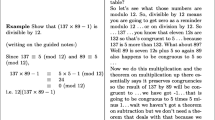Abstract
The study of student notetaking behaviors has produced useful insights into how students learn from lectures. This article presents five preliminary conclusions about notetaking practices based on findings from the notetaking literature. Each conclusion is followed by a discussion of the implications for classroom instruction. Finally, the author proposes links between various lecturer and student behaviors and the external events of instruction described by Gagne and Briggs (1979).
Similar content being viewed by others
References
Berliner, D.C.ATI in two studies of learning from lecture instruction. Berkeley, CA: Far West Lab for Educational Research & Development, 1971. (ERIC Document Reproduction Service No. ED 046 249).
Berliner, D.C.The generalizability of ATI across subject matter. Berkeley, CA: Far West Lab for Educational Research & Development, 1972. (ERIC Document Reproduction Service No. ED 062 642).
Carter, J.F., & Van Matre, N.H. Notetaking versus notehaving.Journal of Educational Psychology, 1975, 67, 900–904.
Corey, S.M. The efficacy of instruction in notetaking.Journal of Educational Psychology, 1955, 26(3), 204–209.
Craik, F.I.M., & Tulving, E. Depth of processing and retention of words in episodic memory.Journal of Experimental Psychology, General, 1975, 104, 268–294.
Cronbach, L. & Snow, R.Aptitudes and instructional methods. New York: Irvington Press, 1977.
DiVesta, F.J., & Gray, S. Listening and notetaking. II. Immediate and delayed recall as function of variations in thematic continuity, notetaking and length of listening review intervals.Journal of Educational Psychology, 1973, 64, 278–287.
Fisher, J.L., & Harris, M.B. Effect of notetaking and review on recall.Journal of Educational Psychology, 1973, 65(3), 321–325.
Gagne, R. & Briggs, L.Principles of instructional design. New York: Holt, Rinehart, & Winston, 1979.
Ganske, L. Notetaking: A significant and integral part of learning environments. Educational Communications and Technology Journal, 1981, 29(3), 155–175.
Greene, E.G. Lecture vs. reading.Genetic Psychology, Monographs, 1928,4, 457–560.
Hartley, J. & Cameron, A. Some observations on the efficiency of lecturing.Educational Review, 1967, 20, 30–37.
Hartley, J. & Davies, I. Note-taking: A critical review.Programmed Learning and Educational Technology, 1978, 15(3), 207–224.
Howe, M.J.A. Using student’s notes to examine the role of the individual learner in acquiring meaningful subject matter.Journal of Educational Research, 1970, 64, 61.
Howe, M. & Godfrey, J. Student notetaking as an aid to learning. Exeter University Teaching Services Department, Exeter, UK, 1977.
Ladas, H.S. Notetaking on lectures: An information processing approach.Educational Psychologist, 1980,15(1), 44–53.
Maddox, H. & Hoole, E. Performance decrement in the lecture.Educational Review, 1975, 28, 17–30.
Norton, L. The effects of notetaking and subsequent use on long-term recall.Programmed Learning and Educational Technology, 1981, 18(1).
Palmatier, R.A., & McNinch, G. Sources of gains in listening skills: Experimental or pre-test experience?Journal of Communication, 1972, 22(3), 70–76.
Peper, R.J., & Mayer, R.E. Notetaking as a generative activity.Journal of Educational Psychology, 1978, 70(4), 514–522.
Peters, D.L. Effects of notetaking and rate of presentation on short-term objective test performance,Journal of Educational Psychology, 1972, 63, 276–280.
Shimmerlik, S.M., & Nolan, J.D. Reorganization and recall of prose.Journal of Educational Psychology, 1976, 68, 779–786.
Thomas, G.S. Use of student notes and lecture summaries as study guides for recall.Journal of Educational Research, 1978, 71(6), 316–319.
Tobias, S. Achievement treatment interactions.Review of Educational Research, 1976, 46, 61–74.
Tobias, S. Adapting instruction to individual differences among students.Educational Psychologist, 1981, 16, 111–120.
Tobias, S. When do instructional methods make a difference?Educational Researcher, 1982, 11(4), 4–9.
Travers, R.M.W.Essentials of Learning. New York: 3rd edition, The Macmillan Company, 1967.
Author information
Authors and Affiliations
Rights and permissions
About this article
Cite this article
Carrier, C.A. Notetaking research. Journal of Instructional Development 6, 19–26 (1983). https://doi.org/10.1007/BF02906208
Issue Date:
DOI: https://doi.org/10.1007/BF02906208




